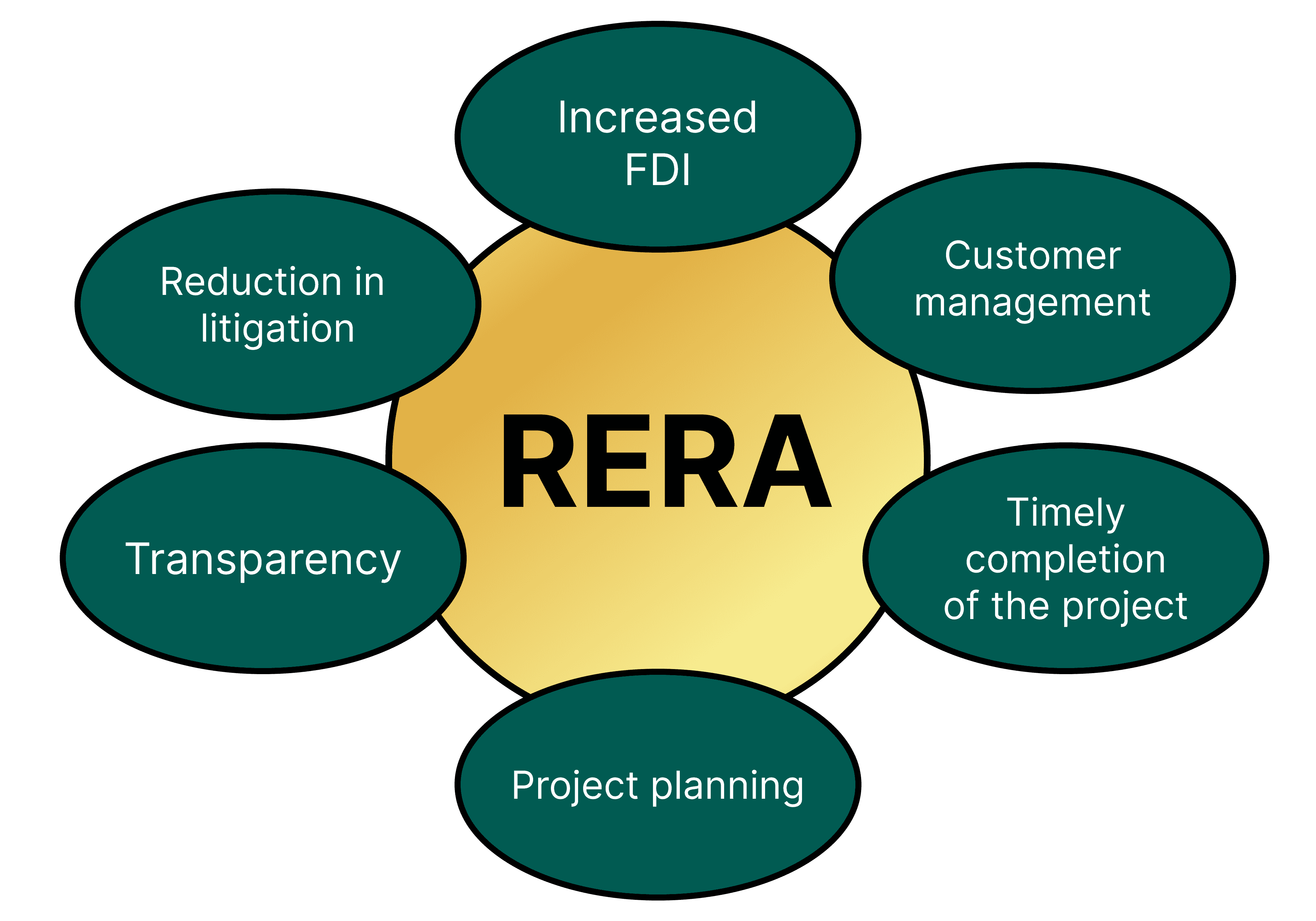Table of Contents
Real Estate Regulation and Development Act, 2016 - An Overview
The Indian Parliament passed the Real Estate (Regulation and Development) Act 2016 to streamline the blooming real estate industry and make the property buying and selling process smooth, transparent and integral. The purpose of the RERA Act is to uphold the rights and liabilities of buyers and builders across all states of the country. The RERA Act is effective on and from 1 May, 2016 and comprises 10 chapters which are further classified into 92 provisions, of which 52 were notified at that time and the rest were effective on and from 1 May, 2017.
Need for Regulatory in the Real Estate Sector
The Real Estate Sector in India is growing at a significant pace and emerging as a prominent source of wealth creation for people looking to invest their money with a goal of high rate of investment. Currently, the real estate industry in India contributes about 8.53% of total GDP. With a growth rate of about 30%, India’s real estate market has witnessed emerging state-of-the-art commercial and residential properties from the most sought-after builders across the nation like Godrej Properties, L&T Realty, M3M Group, DLF Limited, ACE Group etc. RERA Act drafted out a proper policy and regulation for this blooming real estate sector and to enhance real estate investments that prompt a large group of people to buy property for sale under a regulation policy that protects their rights and interests.
What is the RERA Act?
Real estate sector in India has been the crucial pillar of the economy and is the source of wealth creation and earning for a large population of India. Although, it was widely unregulated. In order to regulate the real estate sector and bring professionalism and standardisation across the country, the parliament enacted RERA Act, effective on and from 1 May, 2016. RERA Act is a real estate regulation policy containing 92 provisions which aims to uphold the consumer rights and interest of the buyers and brings uniformity and standardised business practises across every real estate project in the country. It set transparency, integrity, and accountability in the real estate business and enabled a fast-track mechanism for the resolution of disputes.
RERA Full Form and its Analysis
RERA stands for Real Estate Regulatory Authority, a regulatory body that came with the enactment of RERA Act, 2016 and protects the rights and interests of buyers and builders by bringing uniform and standard practices in the real estate sector across the country. The Real Estate Regulatory Authority regulates both commercial and residential properties in accordance with the laws presented in the Real Estate (Regulation and Development) Act, 2016.
Objectives of the RERA Act, 2016 are:

What is RERA Approved?
RERA approved is a layman term for a real estate project that has acquired the mandatory papers and approval from the state real estate regulatory to build a property for sale. The term ‘RERA Approved’ is often used by builders and channel partners in real estate in their sales and marketing strategies. RERA registered or RERA Certified is an official term used to denote a property for sale that is registered under the state’s real estate regulatory authority. After the enactment of the RERA Act, 2016, each builder with an area of property more than 500 sq m, needs to register that property under the state's RERA before starting marketing the real estate project. ‘RERA approved’ and ‘RERA registered’ are often used interchangeably in day-to-day usage but in fact they are different terms. It is advised to buyers to do due diligence and analyse the project details on the official RERA website before making a real estate investment.
Chronology of Events leading to the RERA Act, 2016
| May, 2008 | First time Concept Paper on real estate regulations by Ministry of HUPA |
|---|---|
| 2011 | A central law suggested by the Ministry of Housing for the real estate sector |
| June, 2013 | Approval of Real Estate Bill, 2013 by the Union Cabinet |
| August, 2013 | Real Estate Bill was introduced in the Rajya Sabha |
| February, 2014 | Standing Committee was laid for amendments |
| April, 2015 | Approval of amendments by the Union Cabinet |
| December, 2015 | Real Estate Bill, 2015 approved by the Union Cabinet after incorporating amendments and making modifications |
| 10 March, 2016 | Real Estate(Regulation and Development) Act, 2016 passed by Rajya Sabha |
| 15 March, 2016 | RERA Act, 2016 passed by Lok Sabha |
| 25 March, 2016 | President assent the RERA Act, 2016 |
Key Points Under the RERA Act, 2016
Real Estate (Regulation and Development) Act, 2016 brings uniformity in real estate practices across the country and assures a transparent and seamless experience for buyers and builders in the process of buying and selling real estate projects.
Crucial key points under the RERA Act, 2016 include:
How do I make sure that a property is RERA compliant?
The main points to consider before understanding if a property is RERA Compliant are:
How does the RERA Act benefit Real Estate Business?
Key benefits of the RERA Act include:
Changes in the Real Estate Business after RERA Act, 2016
The Real Estate (Regulation and Development) Act, 2016 changed the contours of the real estate industry and brought about revolutionary changes, like transparency, integrity and accountability. It streamlined the real estate sector by upholding the rights and interests of buyers and builders with uniform and standardised real estate business practices across the country. RERA Act, 2016 changed the dynamics of the real estate business bringing professional and standardised property buying and selling experience across the country.
Crucial changes in the real estate sector after the RERA Act, 2016 include:
For Real Estate Builders
For Real Estate Builders
For Real Estate Builders
Looking for RERA Approved Projects: Check RERA Website!
The RERA Act makes it mandatory for builders to obtain an unique project-wise RERA registration number which is available on the state’s RERA website. Here, we list state-wise list of the RERA website:
| State-wise RERA | Official RERA Website |
|---|---|
| RERA Maharashtra | https://maharera.maharashtra.gov.in/ |
| RERA Gujarat | https://gujrera.gujarat.gov.in/#/ |
| RERA Karnataka | https://rera.karnataka.gov.in/home?language=en |
| RERA Rajasthan | https://rera.rajasthan.gov.in/ |
| RERA MP | https://www.rera.mp.gov.in/ |
| RERA Punjab | https://rera.punjab.gov.in/ |
| RERA Bihar | https://rera.bihar.gov.in/ |
| RERA Telangana | https://rerait.telangana.gov.in/SearchList/Search |
| RERA Haryana | https://haryanarera.gov.in/ |
| RERA Goa | https://rera.goa.gov.in/reraApp/#_ |
| RERA Delhi | https://land.delhi.gov.in/land/real-estate-regulatory-authority-branch |
| RERA Kerala | https://rera.kerala.gov.in/ |
| RERA UP | https://up-rera.in/index |
| RERA West Bengal | https://rera.wb.gov.in/ |
How MoneyTree Realty is Channelising the Real Estate Sector?
MoneyTree Realty is the Top Channel Partner in Real Estate and features a diverse portfolio of commercial and residential properties across the country from leading real estate developers like DLF Limited, M3M Group, Elan Group, Godrej Properties, Paras Buildtech, etc. Under the leadership of Mr. Sachin Arora, real estate consultants at MoneyTree Realty continuously strive to provide top-notch consultations and valuable insights into market trends and help you make a strategic and promising real estate investment.
Services Offered by MoneyTree Realty include:
| Follows a Client-Centric Approach | Best-in-class Property Consultations |
|---|---|
| Maintain Transparency while you buy a Property for Sale | Provides Data-backed Analytics on Property/Market Trends |
| Upholds Integrity and Accountability | Maintain Ethical Standards and Professionalism |
Are you tired of looking at properties for sale?
Real estate consultants at MoneyTree Realty provide a diverse portfolio of commercial and residential properties from leading real estate developers in India. We provide best-in-class property consultations while maintaining a client-centric approach and helping you buy property for sale at best market prices along with other exciting deals and offers. To buy the property of your dream and make a strategic investment, reach out to us on +91 973200007 .
Frequently Asked Questions





